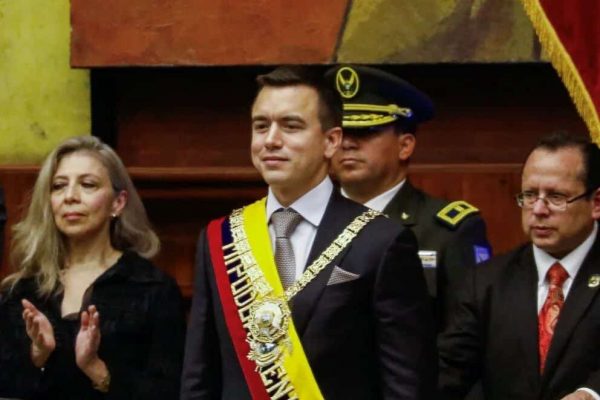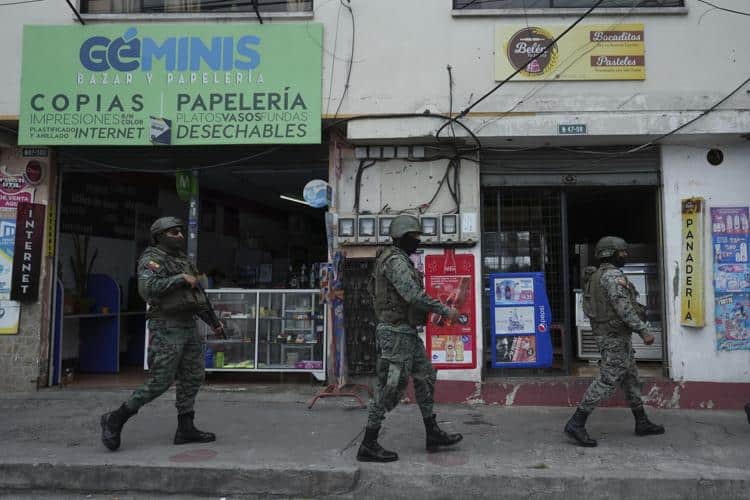Ecuador stands at a crossroads, precariously balanced between the aspirations of a young democracy and the brutal realities of a security crisis that gnaws at its core. Beyond the sensational headlines of prison riots and armed confrontations lie intricate threads of history, economic hardship, and a prison system consumed by the shadows of powerful criminal gangs. To understand the crucible in which Ecuador finds itself, we must delve beyond the immediate flames and into the embers of long-smoldering challenges.
A Crucible Forged in History:
Ecuador’s geographical position, nestled between Colombia and Peru, has long made it a strategic waypoint on the cocaine trafficking route. This historical reality, coupled with decades of political instability and economic inequality, created fertile ground for the rise of powerful criminal organizations. Gangs like Los Choneros, with their ruthless efficiency and vast networks, have established themselves as potent forces not just within the confines of prisons, but in the streets of bustling cities like Guayaquil, thenation’s economic and commercial hub.
Prisons: Incubators of Violence and Power:
Ecuador’s prison system, plagued by overcrowding, understaffing, and a rampant culture of corruption, has become a grotesque parody of its intended purpose. Far from centers of rehabilitation, these dilapidated facilities have morphed into incubators of violence and gang power. Escape attempts are frequent, control is tenuous, and gang rivalries erupt into deadly clashes with alarming regularity. The recent hostage crisis, where over 100 prison staff were held captive, served as a grim reminder of the state’s diminished authority within its own walls.
The Scars of the Pandemic:
The COVID-19 pandemic, like a cruel catalyst, has exacerbated Ecuador’s vulnerabilities. Economic hardship, job losses, and social unrest disproportionately impacted the nation’s most vulnerable, pushing many towards the precipice of desperation. This fertile ground for criminal activity created a perfect storm – gangs capitalized on the societal fracture, further tightening their grip on communities and expanding their influence.

President Noboa’s Phoenix Plan: A Gamble on Security:
Newly elected on a security-focused platform, President Daniel Noboa unveiled the ambitious “Phoenix Plan,” a multi-pronged strategy aimed at taming the flames of violence. The plan, with its hefty $800 million price tag, boasts a mix of technological advancements, infrastructure upgrades, and a controversial militarization approach.
Intelligence and Technology: The establishment of a new intelligence unit, coupled with advanced equipment for security forces, aims to provide an edge in the information war against criminal organizations. Drone surveillance, data analysis, and improved communication networks are key components of this ambitious arm of the plan.
Refortifying the Walls: Building high-security prisons and strengthening port and airport security are intended to disrupt drug trafficking routes and secure key entry points. However, questions linger about the long-term feasibility of such projects, particularly amidst the nation’s economic struggles.
The Military Muscle: Noboa’s decision to deploy the military within prisons and designate several gangs as “terrorist groups” represents a stark escalation. While proponents argue that it demonstrates a zero-tolerance stance against crime, critics raise concerns about potential human rights violations and the militarization of internal security. The long-term effectiveness of such measures remains shrouded in uncertainty.
Recent Eruptions: From Prisons to Streets
The events of the past weeks have served as a chilling testament to the precariousness of Ecuador’s security situation. The prison hostage crisis, followed by a wave of violence spilling onto the streets – shootings, kidnappings, and the unprecedented armed takeover of a live TV studio – have rattled the nation to its core. These incidents are not isolated outbursts, but rather stark illustrations of the deep-seated challenges that plague the country.
Unanswered Questions and Lingering Doubts:
President Noboa’s “Phoenix Plan,” while ambitious, faces scrutiny and skepticism. Doubts abound about its cost, the potential pitfalls of militarization, and its ability to address the root causes of crime beyond immediate security measures. Will the plan truly rise from the ashes and foster long-term stability, or will it prove to be a temporary flicker in the darkness?
Furthermore, genuine security cannot be achieved through brute force alone. Addressing issues like poverty, inequality, and the lack of opportunity are crucial to severing the cycle of violence and fostering lasting peace. Noboa’s upcoming plebiscite on extradition and asset seizure is a gamble, seeking public support for harsher policies. Will the nation stand united in the face of this crisis, or will divisions deepen, further fueling the flames of unrest?
Beyond the Headlines: A Call for Nuance and Deeper Understanding:
Sensational headlines and simplified narratives do little to serve the complex reality of Ecuador’s security crisis. To truly understand the challenges the nation faces, we must move beyond the immediate events and delve into the historical, social, and economic factors that have brought it to this point. Only through a nuanced analysis, a commitment to transparency and accountability, and a willingness to address the root causes of violence can Ecuador hope to emerge from this crucible stronger and more unified.
Several crucial questions demand attention:
Can Noboa’s “Phoenix Plan” deliver on its ambitious promises, or will it succumb to the weight of its own complexity and inherent contradictions?
How can Ecuador strike a balance between the immediate need for security and the long-term imperative of social justice and economic opportunity?
Will the nation find the unity and resilience needed to overcome this crisis, or will divisions and competing interests further exacerbate the instability?
These are not questions with easy answers, but they are questions that demand thoughtful engagement and sustained attention. Ecuador’s struggle for security is not merely a domestic concern; it is a microcosm of the challenges faced by nations around the globe grappling with issues of inequality, violence, and the ever-shifting threat of transnational crime. By understanding the complexities of Ecuador’s crucible, we can gain valuable insights into the larger fight for a more just and secure world.This is not the end. It is a call to action. Let us engage in informed and responsible discussions, challenge simplistic narratives, and actively seek solutions that go beyond headlines and delve into the heart of the matter. Ecuador’s future, and the future of nations facing similar challenges, may depend on it.
Join the conversation. Share your thoughts, explore the resources provided, and contribute to a nuanced understanding of this critical issue. Together, we can help illuminate the path towards a brighter future for Ecuador and beyond.
Additional Resources:
Insight Crime: Ecuador Crackdown: Can Noboa Tame the Fieras?
Human Rights Watch: Ecuador: Prisons in Crisis
BBC News: Ecuador declares state of emergency after prison riots and gang violence
International Crisis Group: Ecuador: A Nation at a Crossroads

